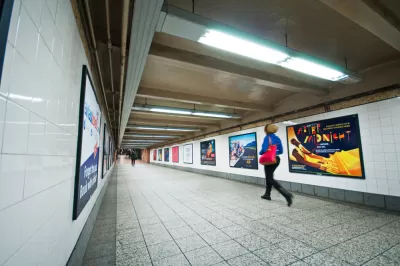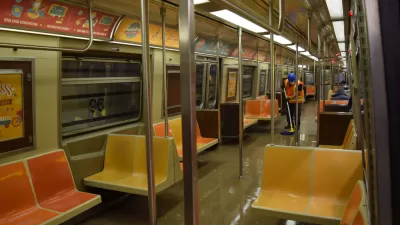Two of the most transit rich regions in the United States have sounded alarms about the need for federal relief as transit ridership plummets as workers stay home or avoid public transit. The APTA is supporting the cause.

Christina Goldbaum reports for the New York Times:
New York City’s public transportation system, the largest in North America, is seeking a $4 billion federal bailout as the coronavirus pandemic has triggered an extraordinary free fall in ridership and left transit officials facing what is likely to be the worst economic crisis in decades.
The request was made earlier this week after the Metropolitan Transportation Authority saw plummeting ridership on every component of its system--subway, buses, Metro-North Railroad, and Long Island Railroad.
Nearby New Jersey is also facing a similar crisis, as reported by Colleen Wilson for NorthJersey.com. “NJ Transit President and CEO Kevin Corbett is requesting a $1.25 billion bailout to account for losses the agency is experiencing amid the coronavirus outbreak,” according to Wilson. “Ridership has plummeted 88% system-wide since March 9 and the agency has been providing some refunds for monthly pass-holders who began working from home.”
A similar story is also unfolding in Washington, D.C., where Washington Metropolitan Area Transit Authority General Manager Paul Wiedefeld recently reported to Congress an 85% dip in ridership on D.C. Metro. “We need immediate operating funding to address this unprecedented loss of $52 million a month,” according to a letter sent by Wiedefeld, and reported by Neal Augenstein for WTOP.
The American Public Transportation Association (APTA), the nonprofit advocate for public transit agencies, has asked Congress for $12.9 billion in aid, according to an article published on March 17 Government Technology.
“Ridership declines related to the virus impact on public transit will correspond to $6 billion in lost fares, down 75 percent for the next six months,” according to the article. The APTA’s statement requesting the emergency funding is available online.
FULL STORY: Hard-Hit Transit Asks Congress for $12.9B in Emergency Funds

Planetizen Federal Action Tracker
A weekly monitor of how Trump’s orders and actions are impacting planners and planning in America.

Map: Where Senate Republicans Want to Sell Your Public Lands
For public land advocates, the Senate Republicans’ proposal to sell millions of acres of public land in the West is “the biggest fight of their careers.”

Restaurant Patios Were a Pandemic Win — Why Were They so Hard to Keep?
Social distancing requirements and changes in travel patterns prompted cities to pilot new uses for street and sidewalk space. Then it got complicated.

Platform Pilsner: Vancouver Transit Agency Releases... a Beer?
TransLink will receive a portion of every sale of the four-pack.

Toronto Weighs Cheaper Transit, Parking Hikes for Major Events
Special event rates would take effect during large festivals, sports games and concerts to ‘discourage driving, manage congestion and free up space for transit.”

Berlin to Consider Car-Free Zone Larger Than Manhattan
The area bound by the 22-mile Ringbahn would still allow 12 uses of a private automobile per year per person, and several other exemptions.
Urban Design for Planners 1: Software Tools
This six-course series explores essential urban design concepts using open source software and equips planners with the tools they need to participate fully in the urban design process.
Planning for Universal Design
Learn the tools for implementing Universal Design in planning regulations.
Heyer Gruel & Associates PA
JM Goldson LLC
Custer County Colorado
City of Camden Redevelopment Agency
City of Astoria
Transportation Research & Education Center (TREC) at Portland State University
Camden Redevelopment Agency
City of Claremont
Municipality of Princeton (NJ)





























